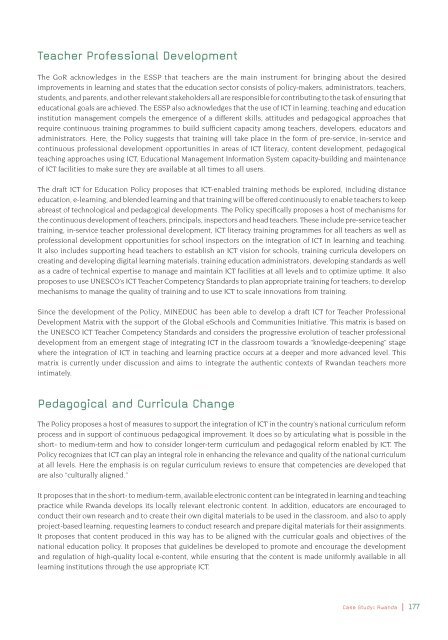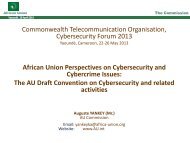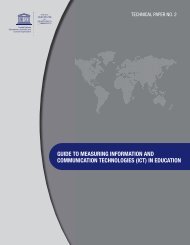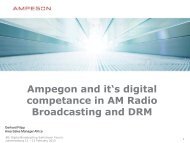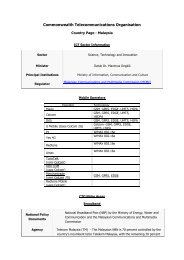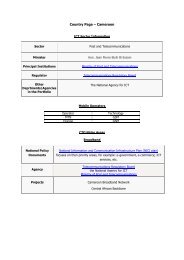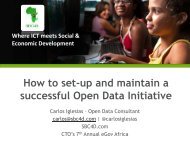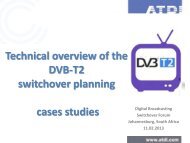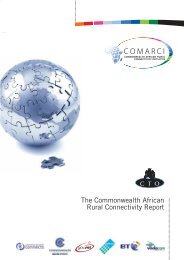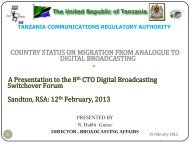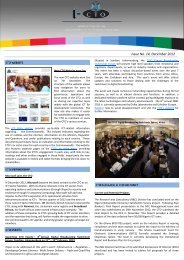Transforming education: the power of ICT policies - Commonwealth ...
Transforming education: the power of ICT policies - Commonwealth ...
Transforming education: the power of ICT policies - Commonwealth ...
Create successful ePaper yourself
Turn your PDF publications into a flip-book with our unique Google optimized e-Paper software.
Teacher Pr<strong>of</strong>essional Development<br />
The GoR acknowledges in <strong>the</strong> ESSP that teachers are <strong>the</strong> main instrument for bringing about <strong>the</strong> desired<br />
improvements in learning and states that <strong>the</strong> <strong>education</strong> sector consists <strong>of</strong> policy-makers, administrators, teachers,<br />
students, and parents, and o<strong>the</strong>r relevant stakeholders all are responsible for contributing to <strong>the</strong> task <strong>of</strong> ensuring that<br />
<strong>education</strong>al goals are achieved. The ESSP also acknowledges that <strong>the</strong> use <strong>of</strong> <strong>ICT</strong> in learning, teaching and <strong>education</strong><br />
institution management compels <strong>the</strong> emergence <strong>of</strong> a different skills, attitudes and pedagogical approaches that<br />
require continuous training programmes to build suffi cient capacity among teachers, developers, educators and<br />
administrators. Here, <strong>the</strong> Policy suggests that training will take place in <strong>the</strong> form <strong>of</strong> pre-service, in-service and<br />
continuous pr<strong>of</strong>essional development opportunities in areas <strong>of</strong> <strong>ICT</strong> literacy, content development, pedagogical<br />
teaching approaches using <strong>ICT</strong>, Educational Management Information System capacity-building and maintenance<br />
<strong>of</strong> <strong>ICT</strong> facilities to make sure <strong>the</strong>y are available at all times to all users.<br />
The draft <strong>ICT</strong> for Education Policy proposes that <strong>ICT</strong>-enabled training methods be explored, including distance<br />
<strong>education</strong>, e-learning, and blended learning and that training will be <strong>of</strong>fered continuously to enable teachers to keep<br />
abreast <strong>of</strong> technological and pedagogical developments. The Policy specifi cally proposes a host <strong>of</strong> mechanisms for<br />
<strong>the</strong> continuous development <strong>of</strong> teachers, principals, inspectors and head teachers. These include pre-service teacher<br />
training, in-service teacher pr<strong>of</strong>essional development, <strong>ICT</strong> literacy training programmes for all teachers as well as<br />
pr<strong>of</strong>essional development opportunities for school inspectors on <strong>the</strong> integration <strong>of</strong> <strong>ICT</strong> in learning and teaching.<br />
It also includes supporting head teachers to establish an <strong>ICT</strong> vision for schools, training curricula developers on<br />
creating and developing digital learning materials, training <strong>education</strong> administrators, developing standards as well<br />
as a cadre <strong>of</strong> technical expertise to manage and maintain <strong>ICT</strong> facilities at all levels and to optimize uptime. It also<br />
proposes to use UNESCO’s <strong>ICT</strong> Teacher Competency Standards to plan appropriate training for teachers; to develop<br />
mechanisms to manage <strong>the</strong> quality <strong>of</strong> training and to use <strong>ICT</strong> to scale innovations from training.<br />
Since <strong>the</strong> development <strong>of</strong> <strong>the</strong> Policy, MINEDUC has been able to develop a draft <strong>ICT</strong> for Teacher Pr<strong>of</strong>essional<br />
Development Matrix with <strong>the</strong> support <strong>of</strong> <strong>the</strong> Global eSchools and Communities Initiative. This matrix is based on<br />
<strong>the</strong> UNESCO <strong>ICT</strong> Teacher Competency Standards and considers <strong>the</strong> progressive evolution <strong>of</strong> teacher pr<strong>of</strong>essional<br />
development from an emergent stage <strong>of</strong> integrating <strong>ICT</strong> in <strong>the</strong> classroom towards a “knowledge-deepening” stage<br />
where <strong>the</strong> integration <strong>of</strong> <strong>ICT</strong> in teaching and learning practice occurs at a deeper and more advanced level. This<br />
matrix is currently under discussion and aims to integrate <strong>the</strong> au<strong>the</strong>ntic contexts <strong>of</strong> Rwandan teachers more<br />
intimately.<br />
Pedagogical and Curricula Change<br />
The Policy proposes a host <strong>of</strong> measures to support <strong>the</strong> integration <strong>of</strong> <strong>ICT</strong> in <strong>the</strong> country’s national curriculum reform<br />
process and in support <strong>of</strong> continuous pedagogical improvement. It does so by articulating what is possible in <strong>the</strong><br />
short- to medium-term and how to consider longer-term curriculum and pedagogical reform enabled by <strong>ICT</strong>. The<br />
Policy recognizes that <strong>ICT</strong> can play an integral role in enhancing <strong>the</strong> relevance and quality <strong>of</strong> <strong>the</strong> national curriculum<br />
at all levels. Here <strong>the</strong> emphasis is on regular curriculum reviews to ensure that competencies are developed that<br />
are also “culturally aligned.”<br />
It proposes that in <strong>the</strong> short- to medium-term, available electronic content can be integrated in learning and teaching<br />
practice while Rwanda develops its locally relevant electronic content. In addition, educators are encouraged to<br />
conduct <strong>the</strong>ir own research and to create <strong>the</strong>ir own digital materials to be used in <strong>the</strong> classroom, and also to apply<br />
project-based learning, requesting learners to conduct research and prepare digital materials for <strong>the</strong>ir assignments.<br />
It proposes that content produced in this way has to be aligned with <strong>the</strong> curricular goals and objectives <strong>of</strong> <strong>the</strong><br />
national <strong>education</strong> policy. It proposes that guidelines be developed to promote and encourage <strong>the</strong> development<br />
and regulation <strong>of</strong> high-quality local e-content, while ensuring that <strong>the</strong> content is made uniformly available in all<br />
learning institutions through <strong>the</strong> use appropriate <strong>ICT</strong>.<br />
Case Study: Rwanda | 177


